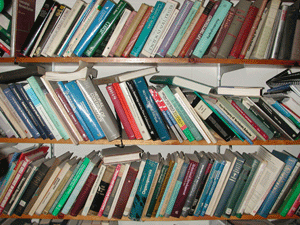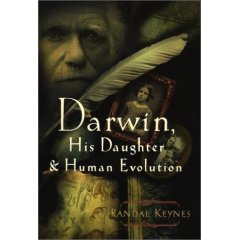Serendip is an independent site partnering with faculty at multiple colleges and universities around the world. Happy exploring!
Darwin, His Daughter and Human Evolution

|
Serendip's Bookshelves |
 Randal Keynes, Darwin, His Daughter and Human Evolution. Riverhead, 2001 Randal Keynes, Darwin, His Daughter and Human Evolution. Riverhead, 2001
Commentary by Anne Dalke (August 2006). |
Randal Keynes is Charles Darwin's great-great-grandson, and he has used his access to family papers to write a biography of a father profoundly attentive to the growth and pleasures of his eleven children, and as profoundly distraught at their suffering--in particular at the death of 10-year-old Annie. Although I wasn't entirely convinced by Keynes' argument that Darwin's theories about evolution were impelled by his own suffering, and by his powerlessness at that of his children, I did find much along the way that was valuable and useful, and I want to record some of it here.
By far most striking to me was Darwin's conviction that not believing in God was a more comforting position to take than looking for answers from an all-powerful Deity. "Cruelty and pain were," to him, "not a moral issue because they were the outcome of purely natural processes . . . he believed that God had no particular concerns about any of the individual consequences of those processes" (95). As Darwin wrote in a letter, "'It has always appeared to me more satisfactory to look at the immense amount of pain and suffering in this world as the inevitable result of the natural sequence of events, i.e. general laws, rather than from the direct intervention of God.' It was easier to come to terms with pain and suffering if there was no question of a Divine purpose governing the life and death of individuals you cared for" (304).
There are many stories, throughout Keynes' text, of such care, and of family playfulness; one particularly endearing report is that of a son that "his father's body was very hairy; the children would put their hands inside his shirt 'and he would growl like a bear at us'" (102). Remarkable, in the context of such affection, is the degree to which the Darwins encouraged their children to think for themselves. One daughter, who rejoiced in the sense of freedom she had as a child, reported that "Our father and mother would not even wish to know what we were doing or thinking unless we wished to tell" (123). Such a father would, of course, have been unhappy, as Darwin was, 'with the emphasis in the school syllabus on Latin and Greek. When [his oldest son] Willy went to Rugby School, Charles believed he could see the 'contracting effects on his mind of his very steady attention to classics: formerly I think he had more extended interests, and cared more for the causes and reasons of things'" (125).
According to visitors, such abstraction colored all Darwin family gatherings: "'there is no family talk, no personal talk, it is more about the world at large and everything in general. Each goes his own way, thinks his own thoughts to himself'. . . . there was never any quarelling . . . all so reserved that conversation was sometimes difficult. . . . 'they do not talk about their own affairs at all . . . . you feel like telling them the deepest secrets just for the sake of talking'" (263).
Another particularly striking aspect of Darwin's character was his ability to acknowledge others as friends, to share work, for instance, with his children's governness. As Darwin himself reported, "Miss Thorley and I are doing a little botanical work for our amusement . . . making a collection of all the plants, which grow in a field . . . allowed to run waste for fifteen years. . . . If ever you catch quite a beginner, and want to give him a taste for botany, tell him to make a perfect list of some little field or wood . . . . it gives a really uncommon interest to the work, having a nice little definite world to work on' . . . . His point was to show 'the degree of diversity in our British plants on a small plot'" (128).
It may be of some interest, perhaps, to know that similar projects are being reiterated on the Bryn Mawr campus: in Biology 103, the first lab assignment is "Darwin's Voyage Revisited"; in a recent Summer Institute for K-12 Teachers, one project likewise involved Exploring Plant Diversity.


